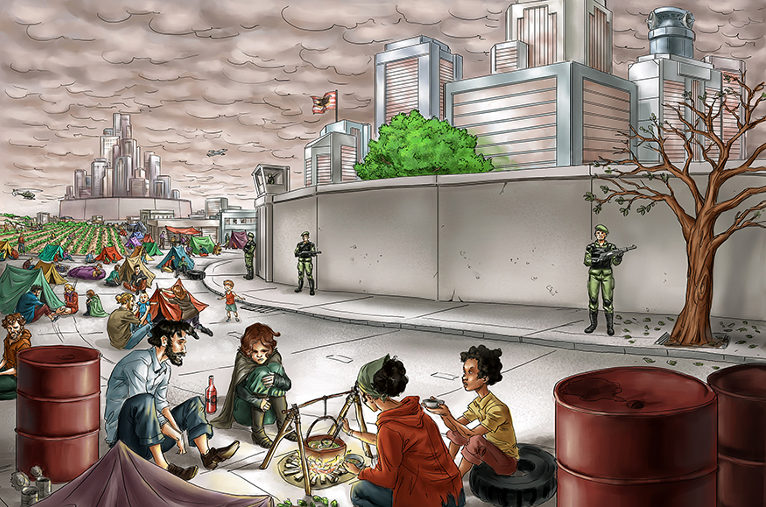Originally published as part of the Forum “After the Pandemic: Which Future?” by the Great Transition Initiative
Thinking about the post-pandemic future and the scenarios that could emerge is as challenging as it is important. One cannot conceive of a more pressing issue for a progressive movement. Finding a workable response is thus of critical importance.
There is, in my reading, a general tendency on the political left to acknowledge the severity of the coronavirus crisis, but then to shift immediately to the possibilities for a major societal transformation. I find this optimism commendable but not always persuasive. As much of it—understandably—seems oriented as much toward what should be as to what is, I worry about overreach. The discussion too often lacks the kind of strategic thinking we need to get to a desirable future.
To be sure, uncertainty about how the crisis will play out makes it difficult to decide how to respond. The wide range of potential implications makes it all the more important to stand behind the commitments of the Great Transition Initiative, its dedication to social equality and political democracy, in particular. By and large, though, we are engaged in a theoretical discourse embraced by progressive intellectuals and activists, not one widely shared by most people around the world. That could change, but it is not the case at the present time.
Still, there are ongoing practical experiments of strategic relevance for a societal transition. Decentralized ecocommunal movements around the world, including urban and rural ecovillages, can offer promising alternatives, foundations on which to scale upwards or launch new experiments. However, these initiatives remain small and relatively uninfluential measured against the size and power of the capitalist mega-machine pushing to return to pre-crisis ways.
As suggested by the authoritarian measures that have been imposed, there is a serious risk of conservative forces prevailing. In any case, these forces will not go away. Given the massive unemployment, major economic disruption, and widespread social anxiety brought by the coronavirus crisis, large numbers of people will unwittingly embrace the paternalist system of a political strongman, first and foremost in the desperate effort to feed their families. In contrast to the older view that people will rise up when things get bad enough, historical sociology shows that this is more likely when lives seem to have gotten better, coupled with new possibilities worth struggling for.
Unfortunately, still missing at the moment is a powerful movement that can articulate a clear and convincing message capable of rallying sufficiently large numbers around the globe to the cause. The program of such a movement needs to include essential elements of democratic socialism, but these ideals and practices have regrettably been discredited by the majority, especially in the US. To be sure, Bernie Sanders generated immense interest in this alternative among young people, but this is not yet the grounds for an emerging revolution.
Arguably, it is more likely that the crisis will set back progressive movements than facilitate them. People worried about their basic safety are not particularly interested in new social experiments. For many, the known system will appear to offer a safer bet. This will certainly be the case for the middle and upper echelons of contemporary society, whose fealty will enable established political and economic leaders to resume their activities with little decisive resistance.
In fact, we already see a rapid return of the old politics and the economic relations it promotes. For example, in San Francisco, the city’s billionaires are fighting the efforts of the local government to address coronavirus-related problems, especially those concerning the large homeless population. In Berlin, the older mainstream lines of political contention are reappearing as the country opens up: Lufthansa gets massively bailed out, but the essential workers, jobless, and social welfare recipients receive only minimal gains.
Globally, we will most likely experience a combination of something resembling the existing capitalist order coexisting with a Fortress World. The great instability and the rhetoric of fear, accompanied by promises of protection, will lead many to support the politics of the strongman. This may result in further COVID-19 setbacks that wipe out whatever progressive gains had been made, Bolsonaro’s Brazil offering a sad example.
How should we then orient ourselves? In my view, the best strategy was laid out by the French philosopher and labor activist Andre Gorz. We need to pursue “structural reforms” (or “non-reformist reforms”), strategically moving ahead piece-by-piece where openings present themselves. But, crucially, these moves must be structurally related to a progressive agenda: they need to ensure and facilitate additional steps forward in political pursuit of the progressive agenda.
We need to think positively, but, in the process, we must be careful not to delude ourselves into believing that we are on the cusp of a Great Transition. In a more just world, the coronavirus crisis could well open the way for a major societal transition. But we are not living in such a world and need to think strategically in light of current political conditions, taking advantage of openings that present themselves along the way. As long as we do not lose the vision of the much-needed societal transition, a strategic focus on non-reformist reforms should be a central part of the way forward.
Teaser photo credit: Great Transition Fortress World scenario image





